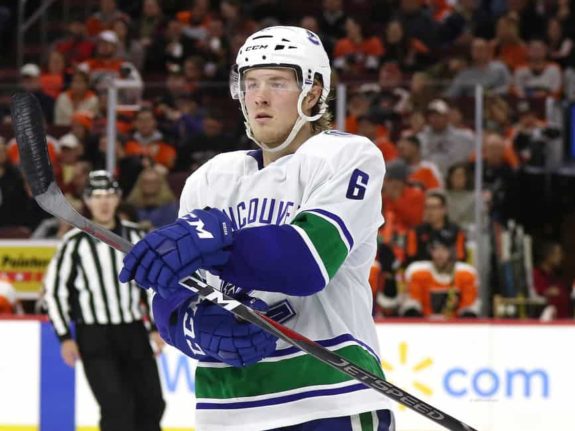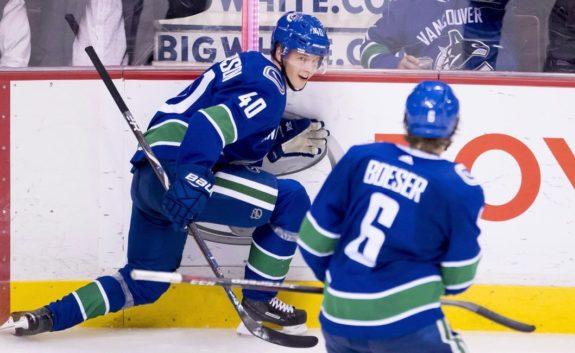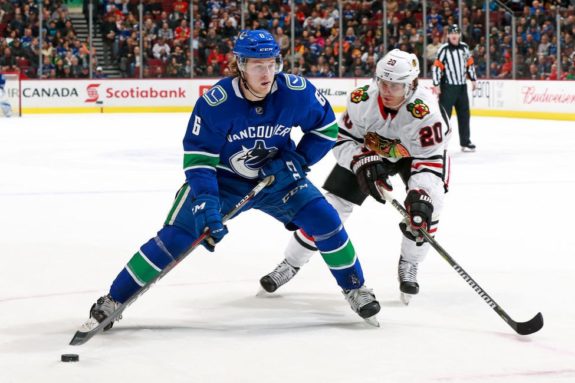When compared to other players in the NHL with similar production to him, Brock Boeser’s next deal could very well be a bridge deal.
I think that he deserves more than that, though.
Boeser was selected 23rd overall by the Vancouver Canucks at the 2015 NHL Entry Draft in Sunrise, Florida. The Canucks, rightfully so, were ecstatic to draft the young American sniper at 23, as Boeser’s shooting abilities caught the attention of general manager Jim Benning right from the first time he watched Boeser play. Boeser captured the hearts of Canucks fans from the moment he stepped onto the ice for the first time in a Canucks uniform, in his hometown on Minnesota.
With a game that was taking place late in the season, a season that was a disappointing one for the Canucks, where they finished with the second-worst record in the entire NHL, you might think that fans may have become uninterested in the remaining games. Many fans, however, woke up early to watch the 10:00 A.M. Pacific Time puck drop against the Wild for the sole reason of watching Boeser’s debut. He did not disappoint.
Boeser Captures the Hearts of Canucks Fans
Boeser’s father, Duke, suffers from Parkinson’s disease. Brock has always been close with his father, and that’s why it made him emotional when the Canucks invited Brock’s mother, Laurie, and Duke, into the dressing room to read out the Canucks’ starting lineup. As Brock prepared to exit the dressing room and head out to the ice to play in his first game, he embraced both of his parents as he tried to fight back tears and stay focused on the task ahead. Starting on a line with legends Daniel and Henrik Sedin, Boeser scored his first career goal that same day, in front of his friends and family in his home state of Minnesota.
What a moment.

In the eight games that remained in that season, Boeser scored three more goals and picked up an assist. Expectations were high for him going into his rookie season as a result. Boeser did not disappoint, as he got off to a red hot start to the 2017-18 season, scoring 20 goals before Christmas had even rolled around. There was the memorable hat trick against the Pittsburgh Penguins, the beautiful goal (one of many) that he scored against the Tampa Bay Lightning, and many, many more. That’s why it was so unfortunate to see his promising rookie campaign come to an end thanks to a freak back injury involving an open bench door.
Boeser later recovered from that injury, but was forced to spend his summer prior to this past season rehabbing his injury and strengthening his core to make sure his back was 100% and lower the risk of reinjuring it as much as he could. The result was him showing up to camp looking more like Brock Lesnar than the Brock Boeser fans had fallen in love with just a year prior. He looked much more buff than he had before his injury, and that seemed to almost slow him down on the ice. It took Boeser a while to get going in the 2018-19 season, and he battled another injury early on in the year. Thankfully, that injury wasn’t related to his back injury.
Boeser Returns and Dazzles
As the season continued, Boeser started to find his groove. He found and enjoyed chemistry on and off the ice with Elias Pettersson, and the two have become great friends. Boeser has yet to play in all 82 games of a season, and with his entry-level contract just expiring and him now needing a contract, I thought it’d be fitting to look at how his production compares to other players around the NHL, and what kinds of deals those players received.
To do this, I will rely heavily on stats on a per-game basis, for example, points and goals per game as opposed to simply points compared to other stars. I did something similar to this earlier in the season, at about the halfway mark, but now with another season complete, let’s see what kind of contracts comparable players to Boeser received.

For reference, Boeser finished the 2018-19 season with 26 goals and 30 assists in 69 games. That means he had .81 points per game and .38 goals per game.
Let’s compare those numbers to other league-wide stars in their sophomore seasons. First up is Nikita Kucherov of the Tampa Bay Lightning. Kucherov, like Boeser, was 21 years old in his sophomore season back in 2014-15. He finished that season with 29 goals and 36 assists in a full 82-game season. That means he had .35 goals per game, and .79 points per game.
It really makes you wonder what Boeser’s ceiling is. I doubt he’ll ever reach 128 points in a season as Kucherov did in his award-filled 2018-19 campaign, but it really does make you wonder just how much further Boeser can take his game still at such a young age.
The next comparable player is San Jose Sharks forward Timo Meier, who in his third season with the Sharks, put up 30 goals and 36 assists in 78 games. That’s good enough for .38 goals per game and .84 points per game. Those numbers are very close to Boeser’s production, and Meier just inked a four-year deal with an average annual value (AAV) of $6 million.
With the Canucks all of a sudden in a cap crunch, it makes you wonder how much Vancouver will take the Meier deal into account. He has had similar production, but personally, I believe the best is yet to come with Boeser. As I mentioned above, he has been hindered by injuries and this summer is his first where I feel as though he will be able to train and work on the skills he wants to.
What’s the Deal?
For reference, after the 2015-16 season, in which he put up 66 points in 77 games, Nikita Kucherov was signed by the Lightning to a three-year deal with an AAV of $4.766 million. When that deal was set to expire this past season, the Lightning had to dish out big money to their star Russian sharpshooter, signing Kucherov to an eight-year deal with an AAV of $9.5 million. That is a big payday indeed. The Canucks have the option of locking up Boeser long term now, or following the Sharks’ and Lightning’s idea of the bridge deal.

If the Canucks believe that Boeser is only going to trend up from here, a long-term deal makes sense. If the Canucks want to err on the side of caution as the Sharks and Lightning did with their comparable players, then a bridge deal, statistically, makes the most sense. In my opinion, the sky is the limit for Boeser. I believe that having this offseason to focus on the aspects of his game that he wants to, rather than having to rehab an injury, will do wonders for his game.
If the Canucks agree with me, then a long-term deal makes the most sense, and they could avoid having to give him a big payday in three-to-four years as the Lightning were forced to do with Kucherov. If the Canucks pay attention to these stats, however, then a bridge deal could be in store for the Vancouver Canucks beloved Prince Charming.